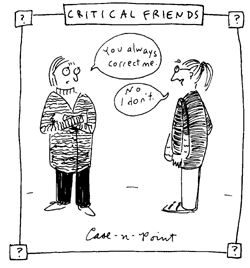Build your best team: prioritize critical friends, not just colleagues
Are you seeking ways to push your work to the next level in 2020? Building a “Core Team” of critical friends from other organizations may be the answer. Core Team is Learn4Life’s Secret Sauce.
What makes L4L’s collective impact effort different? Rather than build a large staff, L4L leverages a little known volunteer corps known as Core Team as an advisory group to drive the work of each Change Action Network and convening. Comprised of leaders representing a broad swath of education and education-adjacent organizations including Metro Atlanta Chamber of Commerce, United Way, the Community Foundation for Greater Atlanta, Georgia Partnership for Excellence in Education, Atlanta Regional Commission, REACH, and GLISI, Core Team meets once per month. Dr. Ken Zeff and his staff thoughtfully prepare pithy questions and materials that invite healthy wrestling around how best to engage voice, model continuous improvement, and advance L4L goals through various network convenings.
At one recent meeting, the group pored over a reporting tool related to STEAM in middle schools across the region and debated how best to craft a prompt to invite meaningful dialogue among network participants about goals and measures that are equal parts attainable, actionable, relevant, and feasible. Virtually every interaction among network participants goes through a dry run and refinement by the L4L Core Team, and they walk the talk of continuous improvement by carefully reviewing feedback data from network participants to inform tweaks to optimize convenings.
As an all-volunteer group, one might expect that enthusiasm and attendance might wane over time. And while attendance by all Core Team members in a single meeting is rare, there are consistently 3-5 members that show up. What brings them back? “I love to hear how other people problem solve. Even if the work of L4L isn’t directly related to what we do, it helps me be a better leader to have this brain trust to push me to think about how my work relates across lots of different sectors – government, non-profit, K-12 and higher ed,” reflects Brad Bryant of REACH. Dana Rickman of GPEE adds, “There are many challenges in the Atlanta region that mirror those we see statewide. I enjoy the give-and-take among my core team colleagues – many of whom have become friends – because I am both learning and have the chance to directly contribute to improving education in the region where I live and raise my children.”
I think about my participation on Core Team as a living petri dish to experience and be part of what research clearly points to as the engine of effective organizations anywhere: collaboration. Core Team is a culturally vibrant group with diverse expertise and experience that engages in a lively, unconstrained exchange of ideas, all singularly focused on advancing the L4L mission to make an impact on children’s lives and on the future of our region.
While there are many reasons why L4L is excelling among its peer organizations around the nation, it seems clear one significant contributor is the governance and feedback structures that guide the organization, including Core Team, which fosters a psychologically safe environment that invites, celebrates, and enhances great ideas.
If you are contemplating developing a Core Team to support your work, consider these questions:
• What are the common goals everyone is invested in? How do these goals connect to Core Team members’ own work?
• What are the leader moves and dispositions you can hone to create a collaborative environment where Core Team members are making a mission-critical contribution to advance goals??
• What governance and meeting structures will facilitate reaching your goals?
Leslie Hazle Bussey, Ph.D., is Executive Director of Georgia Leadership Institute for School Improvement (GLISI), and an L4L Core Team member.

